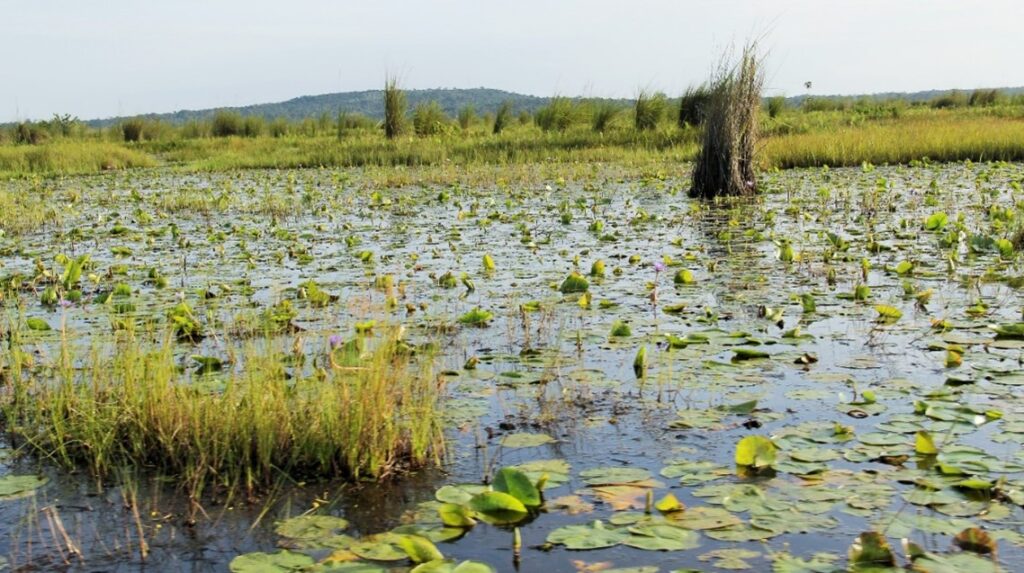
Uganda, boasts an array of natural wonders, among which its wetlands stand out as crucial ecosystems. These wetlands, though, are under severe threat due to human activities and climate change. Revitalizing them isn’t merely an environmental endeavor; it’s a necessity for ensuring water health, biodiversity conservation, and sustainable development. In this article, we delve into the ecological importance of restoring and preserving wetland ecosystems in Uganda.
Wetlands are not just soggy patches of land; they are dynamic ecosystems teeming with life and playing multifaceted roles. They act as natural sponges, absorbing excess water during heavy rainfall and releasing it slowly, thus mitigating floods and droughts. In Uganda, wetlands are vital for regulating water flow in rivers like the Nile, Rwizi, Mpanga and Kagera, upon which millions depend for irrigation, drinking water, and hydropower.
Moreover, wetlands are biodiversity hotspots, supporting a rich variety of plant and animal species. They serve as breeding grounds for birds, nurseries for fish, and habitats for numerous amphibians, reptiles, and mammals. For instance, Uganda’s wetlands are home to iconic species like the shoebill stork, the sitatunga antelope, and the rare papyrus gonolek.
Furthermore, wetlands act as natural filters, purifying water by trapping sediments and absorbing pollutants. They contribute to groundwater recharge, maintaining water quality and quantity in aquifers. Thus, they are crucial for ensuring access to clean drinking water, especially in rural areas where many communities rely on groundwater.
Despite their ecological significance, Uganda’s wetlands face an array of threats, primarily driven by human activities. Encroachment for agriculture, urbanization, and infrastructure development has led to the degradation and loss of vast wetland areas. Illegal activities such as sand mining, poaching, and illegal fishing further exacerbate the problem.
Climate change poses an additional challenge, altering rainfall patterns, increasing temperatures, and exacerbating extreme weather events. These changes disrupt the delicate balance of wetland ecosystems, leading to loss of habitat, biodiversity decline, and water scarcity.
However, revitalizing Uganda’s wetlands requires concerted efforts from government agencies, local communities, NGOs, and international partners and key strategies include strengthening legislation to protect wetlands, enforcing existing laws, and promoting sustainable land use planning are paramount. This entails strict enforcement of wetland regulations, prohibiting encroachment, and implementing zoning laws to prevent further degradation.
Empowering local communities to become stewards of their wetlands is essential. This involves raising awareness about the ecological importance of wetlands, providing alternative livelihoods, and involving communities in decision-making processes regarding wetland management.
Promoting eco-friendly farming techniques that minimize the use of agrochemicals and prevent soil erosion is crucial. Implementing agroforestry, organic farming, and integrated pest management can help conserve wetland ecosystems while ensuring food security and livelihoods.
Investing in wetland restoration projects, such as reforestation, re-establishing native vegetation, and restoring degraded areas, is vital. This includes removing invasive species, restoring natural hydrological patterns, and creating buffer zones to protect wetlands from further degradation.
Conducting scientific research to assess wetland health, monitor biodiversity, and evaluate the effectiveness of conservation efforts is essential. This data can inform evidence-based decision-making and guide adaptive management strategies for long-term wetland conservation.
In a nutshell therefore, Uganda’s wetlands are invaluable ecosystems that provide a myriad of ecological, social, and economic benefits. Preserving and restoring them is not just a matter of environmental conservation; it’s essential for ensuring water security, biodiversity conservation, and sustainable development. By adopting holistic approaches that integrate policy reform, community engagement, sustainable practices, and scientific research, Uganda can safeguard its wetlands for future generations and foster ecological prosperity. It’s time to recognize the ecological importance of wetlands and take concerted action to revitalize these precious ecosystems.


